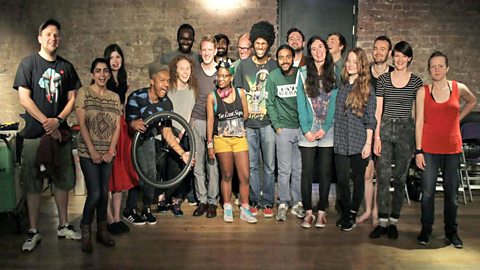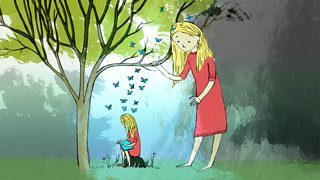What is it really like to be in prison?
“By the time I arrived at the gates, I felt like I’d already lost who I was. All I can remember is telling myself over and over not to cry,” says Brenda of her first day in prison.
She’s sharing her experiences in a new podcast, , that aims to dispel myths about everyday life in jail.
大象传媒 Radio 4’s Law in Action spoke to some of the former prisoners taking part in the podcast to find out how they think it will change perceptions of life inside.

Arrival
When she was transported to prison, Brenda says she remembers wanting to seem braver than she felt.
“I remember getting in the van and everything was moving so slowly outside. I was trying to look out the window and catch every last glimpse I could of the outside world, of normal people. It felt really official - everyone in the van was labelled. We were criminals.”
-
![]()
Law in Action: What鈥檚 it really like to be in prison?
The secrets of life behind bars, revealed in a new podcast series.
During her search on arrival, she says an officer asked her to remove her clip-in weave.
I know that prison is about punishment... I just wish people didn鈥檛 have this misconception that it鈥檚 a holiday camp.Brenda, former prisoner
“I had to give her my hair, and when I was sent to join the other inmates after my search, a lady I’d travelled with in the van said she barely recognised me."
She says she felt as though her identity had been “stripped away” on arrival.
“I just want people to know how we actually feel going through those gates, we’re not proud,” she explains.
“You’ve not got your make-up, your nice hair, your shoes - none of the little things you take for granted that make you feel like you. I know that prison is about punishment and that’s a part of it - I just wish people didn’t have this misconception that it’s a holiday camp.”
Ways of coping
Since completing her sentence, Brenda is has become a poet, running a platform that she says aims to help other artists who have been involved in the criminal justice system.
She says she started writing poetry in prison as a way of expressing her emotions.
“I lost all my faith when I was in prison - I used to have faith in God, but I couldn’t see how this could possibly be His plan for me,” she explains.
“I was rude to other inmates who tried to make friends with me. When a lady asked if I wanted to join her choir, I told her to leave me alone, find someone else to annoy.
“The newspapers just show prisoners reoffending, never changing their ways - and I thought that would be me.
“One night, I started writing my thoughts down on a scrap of paper in my cell. Instead of saying my thoughts out-loud and face getting written up by guards, I’d write them down. It became a form of therapy for me - it gave me hope.”

Expert advice on composing your own spoken word poetry
Will Gompertz meets performance poet Polar Bear as he tutors a class of young poets.

Helping other inmates
David, a former prisoner and now reform campaigner, says his way of coping with life on the inside became through helping other inmates.
He decided he wanted to volunteer as a ‘Listener’ with Samaritans. The scheme trains prisoners to become ‘listeners’ that offer help and support to other inmates at risk of self-harm and suicide.
“I remember going to see one inmate who was ready to take his own life. He wanted to do it that day,” David explains.
“We talked things out - he told me his cell neighbour was aggressive and would punch the wall, which kept him up and frightened him.
“When I asked him what he liked to do, he said he liked drawing. I spoke to the mental health aid worker who was working with me and we got him some art supplies.
“I was worried that night that he might attempt to take his own life, but I was called to his cell the next day.
“Next thing I know, he brings out these two drawings he’s made, hands them to me and says: ‘David, instead of killing myself, I coloured these for you.’
“I can’t quite describe how that made me feel - it’s one of the most positive memories of prison for me.”

What kind of language are Samaritans encouraged to use?
Michael Rosen talks to the Samaritans about how language can help people in crisis.
A turning point
David says the listener scheme has been important to him because of his own experiences during his time inside. In 2009, he says he attempted to take his own life in prison.
I鈥檓 not proud of the things I did, but my experience of prison means I care about the justice system and making sure people can and do change.David, a former prisoner and now reform campaigner
“A friend found me in my cell - I’d overdosed and I was nearly dead.”
His friend raising the alarm meant David was able to get life-saving treatment.
“I don’t quite know how I survived and got through it, but it was a real turning point for me,” he says.
He says that without prison, he wouldn’t be the person he is now.
“Don’t get me wrong, there were really bad times - and the visits especially were awful,” he says. “There’s all this build-up beforehand and you don’t really know what to say to them when you see them. You end up in uncomfortable silence.
“But prison was making me such a better person - I was living a life of crime, and I needed to change it,” he says. “I know that people inside are criminals, but I do think a lot of people outside view prisoners from a place of fear. People in prison are still people, and it’s in everyone’s interest for the justice system to work and rehabilitate them properly."
“It definitely did that for me. I’m not proud of the things I did, but my experience of prison means I care about the justice system and making sure people can and do change."
A chance to reflect
For Brenda, prison gave her the chance to reflect.
“In jail, I was able to sit down and really reflect on my life and what I did,” she explains. “Now, I just want that chance to prove myself - I want to work hard, I want to volunteer and give back. Your neighbours, your cleaner, your colleague - they might be ex-prisoners."
“If you share the stories of people like David and myself, you show just how far you can come and that there is hope of turning things around,” she says.
Listen to Law in Action
-
![]()
Why it is good to feel regret
Rather than trying to eradicate this negative feeling, is it something we should embrace?
More from Radio 4
-
![]()
Law in Action: What鈥檚 it really like to be in prison?
The secrets of life behind bars, revealed in a new podcast series.
-
![]()
Tips and advice for overcoming anxiety
A feeling of worry, nervousness, or unease that we will all experience at points.
-
![]()
How having a purpose can help us
How having a purpose brings a clearer pathway through the dark and difficult winter days.
-
![]()
How you can re-programme your brain
Are we able to rewire and re-programme our own mind and control our own destiny?





